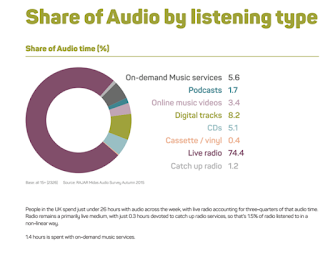Listeners don't really care how they listen, provided it is
convenient and they enjoy the content.
Rajar published its latest MIDAS study last week. That's
where they grab hold of some of the Rajar respondents who completed the online
diaries (as opposed to the good old-fashioned colouring books), and prod them
with a stick for more insight about how their listening was delivered.
MIDAS, by the way, stands for 'Measurement of Internet
Delivered Audio Services'. I'm guessing they made the words
fit the acronym. Just like we do in radio-land. Title first, worry about the
rest later. Sorry, I'm off on a tangent here.
The heading is 'audio' time. In other words, the study
usefully examines how we consume audio generally. A 1978 study would have had
'record players', 'cassette players' and '8 track carts' on the list. Let's remember
there has always been competition for the ear since the strolling mummers.
Folk spend 26 hours per week with audio entertainment, with
live radio making up almost three quarters of that time. Get out the bunting.
That's good news. As we know, live radio
reaches 90% of the population across the week. Although the volume of listening
to catch-up radio and podcasts is relatively low, 8% of adults use catch-up and
7% podcast at least once a week. Podcasts are hugely speech-oriented.
Of the live radio proportion, how are listeners listening?
46.6% is to FM and AM. In other words, more listening is now to things other
than an old-fashioned radio, but analogue broadcast remains the
largest party in a minority government. However, to sustain the metaphor
carelessly, DAB is the Lib Dems, supplying another 35% of listening, meaning
that 'the radio set' remains in power.
It is the most important device overall by some margin (around 82% of
all listening).
It's worth reminding programme teams who may listen
atypically, being funky media chicks, that their audience is still more likely
to be using a radio for the majority of their consumption.
Given Rajar have been busy with these surveys for the last
three years now, we can establish how quickly things are changing. The MIDAS
study in Spring 2014 (which I took to be broadly similar, although fewer
respondents) gave 53% of live radio
listening to AM/FM (now 46.6%) and 32% to DAB (now 35%).
The reach of 'other platforms' for live radio consumption is
now very high. Just over two-thirds of
us ever listen to radio online in any way, for whatever duration.
Who's streaming music? Blokes more than women. In an average week 7.6m access an
on-demand music service, (compared to
48.2m listening to live radio).
On-demand music services account for 6% of all audio hours, which is 1.4
hours per week, tripling to 4.5 hours for 15-24s – 16% of all their audio.
By device, PCs and laptops are ours - with live radio
producing the most audio consumed, closely followed by streaming services.
Tablets are music streaming-led (30%) with radio at 17.6%. Add in catch up
radio to that figure, though, and 'radio' leads. Smartphones have 'digital
tracks' (downloaded music) leading, albeit with live radio closely following.
Brum brum. Live radio accounts for 84% of all in-car
listening, compared to 1.2% for the on-demand music services. There's no slice
on the pie chart denoting ear-time devoted to screaming kids in the back.
As always with research, I try to put it into a
context. As this sample is of those who
have chosen to complete the on-line Rajar diary rather than the paper one, I
imagine that the respondents are a touch more likely to be at the cutting edge of
technology (although I note that provision has been made in the calculations to allow for those who are not
on broadband etc). And I'd also caution that sometimes, as radio sets receive more than one platform and even flip from
platform to platform automatically, and as people listen on ever more devices, the
ability of any individual to know or recollect which device was used for which
slice of listening is open to question.
In the States, the recent Edison/Triton Digital Survey suggests that 93% of U.S. adults listen to
radio weekly. 57% of adults (12+) had listened to online radio in the past
month. The number of people who own a
radio at home was 96% in 2008; it's now 79%.
Back to Blighty, the whole MIDAS survey looks sensible and makes for
interesting reading. It is another creditable and useful piece of intelligence
by the fine folk at Rajar.
What does it tell us?
That most of what we radio stations make is still consumed live, and
that which is not is often distinctive speech. It tells us that we need to be
aware that listeners listen to us in all sorts of ways, and we simply must
ensure that we are always where the listeners expect us to be, and easily found
there, however expensive that increasingly becomes. The radio in the corner or the car remains,
however, hugely important, and it's much too early to presume that our
typical listener is not listening to one for much of the time. But - we need to
be across this whole area, it's changing quickly - and the pattern for younger
demos ever quicker still.
It also reminds us that a new battleground is looming, with cunning new
adversaries. We need to be alert to them, continuing to do what radio does
best, and to miss no trick in distinctive content generation; powerful marketing
for the medium and its content; and in influencing gadget design. It's an unprecedented battle, potentially more bloody than the one posed by television, and we shall have but one chance of winning.













